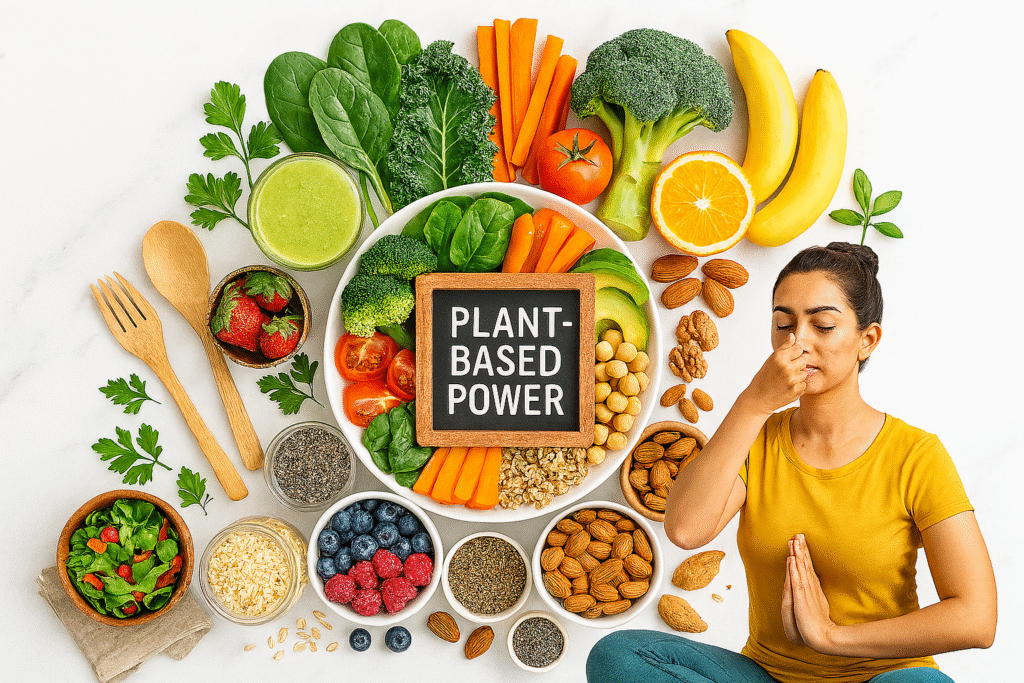The benefits of a plant-based diet are many. It helps you stay healthy. It lowers the risk of heart disease, diabetes, and cancer. It also protects the planet by reducing harm to the environment. Another benefit is showing care and kindness toward animals.
Eating plants is more than a passing trend. It is a smart choice for health, nature, and ethics. In this article, we look at what are benefits of plant based diet. We use trusted research from the World Health Organization (WHO), the American Cancer Society, and other experts.
Health Benefits of a Plant-Based Diet
Why is a plant-based diet good for your health?
A plant-based diet lowers the risk of heart disease, diabetes, cancer, and obesity. It is rich in fiber, vitamins, minerals, and antioxidants that protect long-term health.
Key benefits for health:
- Lowers risk of heart disease and high blood pressure.
- Reduces the chance of type 2 diabetes.
- Helps manage weight and reduces obesity.
- Lowers the risk of some cancers.
- Improves gut health through fiber.
⚠️ The World Health Organization (WHO) lists red and processed meat as Group 1 carcinogens. That means they are as dangerous as smoking and asbestos. This shows why shifting to plant-based eating can reduce serious health risks.
Supporting Evidence:
- American Cancer Society supports plant-based eating for cancer prevention.
- Mayo Clinic states that plant-based diets improve cholesterol and heart health.
- Harvard School of Public Health finds that vegetarians live longer and healthier lives.
Nutritional Advantages of Plant-Based Eating

What nutrients do plant-based diets provide?
Plant foods are full of nutrients that protect against disease.
Nutritional highlights:
- Fiber: Found only in plants, improves digestion and lowers cholesterol.
- Antioxidants: Fight inflammation and protect cells.
- Phytochemicals: Plant compounds that reduce disease risk.
- Healthy proteins: Beans, lentils, tofu, nuts, quinoa.
Note: A well-planned plant-based diet gives almost all nutrients. But you may need Vitamin B12 and Omega-3 supplements for balance.
Environmental Benefits of a Plant-Based Diet

How does plant-based eating help the planet?
A plant-based diet reduces climate change, water use, and deforestation caused by animal farming.
Key facts:
- Animal farming creates 51% of global greenhouse gases (Stanford Environmental Law Journal).
- It is the main cause of deforestation and species loss.
- It uses half of the world’s water and 80% of farmland.
Eating more plants can cut your carbon footprint by 50%.
Authority References:
- UN Environment Programme (UNEP) says diet change is vital to fight climate change.
- Stanford Environmental Law Journal warns that animal products are major drivers of damage.
Compassion & Ethical Benefits
Why does compassion matter?
Plant-based eating reduces the suffering of animals in factory farms.
Factory farming facts:
- Over 56 billion land animals and 90 billion marine animals are killed each year.
- Animals often live in cramped, stressful, and painful conditions.
- Marketing hides this behind “happy farm” images.
By eating plants, we align our choices with compassion, treating animals as living beings, not products.
Real-Life Experiences
- John’s Story: Switched to plant-based food, lowered cholesterol in 3 months, reduced meds.
- Lisa’s Story: Gained energy, better digestion, stable weight after going vegetarian.
- Family Example: Cut grocery costs and ate healthier with grains, beans, and veggies.
Strengths of a Plant-Based Diet
- Reduces risk of chronic disease.
- Supports weight and energy.
- Protects the environment.
- Shows compassion for animals.
- Backed by WHO, American Cancer Society, UNEP.
Challenges to Watch
- Need to plan for B12, iron, and omega-3.
- Social and cultural habits may make transition hard.
- Some plant-based processed foods can be unhealthy.
Comparison Table
| Aspect | Plant-Based Diet | Meat-Based Diet |
|---|---|---|
| Heart Disease Risk | Lower | Higher |
| Cancer Risk | Reduced (esp. colon cancer) | Increased (red/processed meat) |
| Environmental Impact | Low emissions, less land/water use | High emissions, deforestation |
| Ethical Considerations | Reduces animal suffering | Relies on factory farming |
| Cost | Can be affordable with whole foods | Often higher, especially meat |
FAQs
1. What are benefits of plant based diet for weight loss?
Plant-based diets are high in fiber and low in calories, making weight management easier.
2. Can you get enough protein on a plant-based diet?
Yes. Beans, lentils, tofu, tempeh, quinoa, and nuts provide sufficient protein.
3. Is plant-based eating expensive?
No. Whole foods like rice, beans, and vegetables are cheaper than meat.
4. What diseases can a plant-based diet prevent?
It reduces the risk of heart disease, diabetes, certain cancers, and obesity.
5. How does a plant-based diet fight climate change?
By reducing greenhouse gas emissions, deforestation, and water waste linked to animal agriculture.
6. Do doctors support plant-based diets?
Yes. WHO, American Cancer Society, and Harvard all support reducing meat consumption for better health.
Conclusion
So, what are benefits of plant based diet? It improves health, prevents chronic diseases, protects the planet, and reduces animal suffering. From lowering your carbon footprint to extending your life expectancy, the advantages are backed by science, global organizations, and real-life examples.
Author Bio
Farid Ahmmad has first-hand experience living on a plant-based diet, which helped him improve his health, energy, and overall lifestyle. He writes about the science and real-world benefits of plant-based eating, combining personal insights with trusted research from global health organizations.
References
- World Health Organization (WHO) – Classification of red/processed meat.
- American Cancer Society – Position on plant-based diets.
- Stanford Environmental Law Journal – Research on animal agriculture’s environmental impact.
- United Nations Environment Programme (UNEP) – Dietary change recommendations.
- Mayo Clinic & Harvard School of Public Health – Research on plant-based diets and health.
- Time Magazine – “Meat is the new tobacco.”


